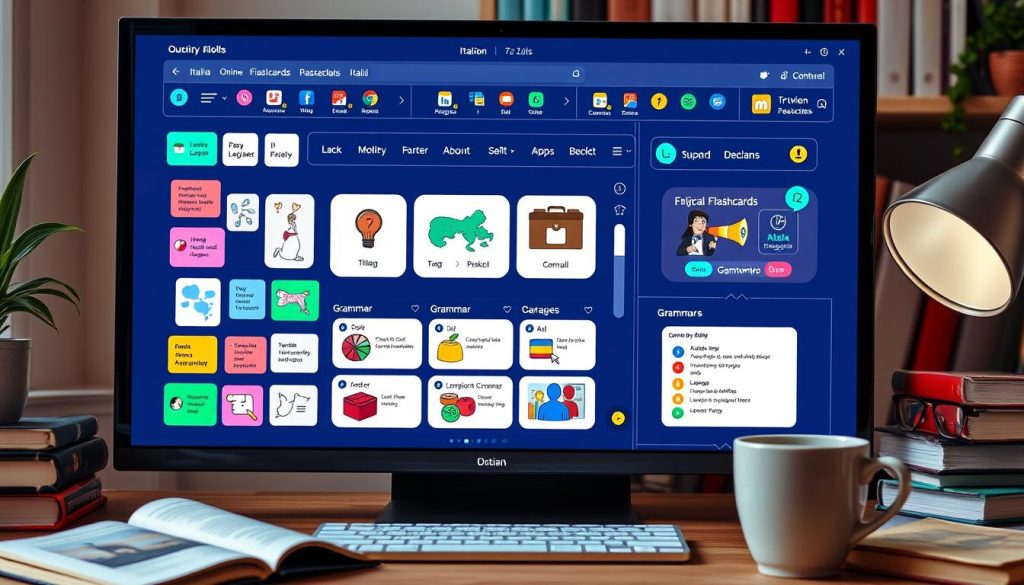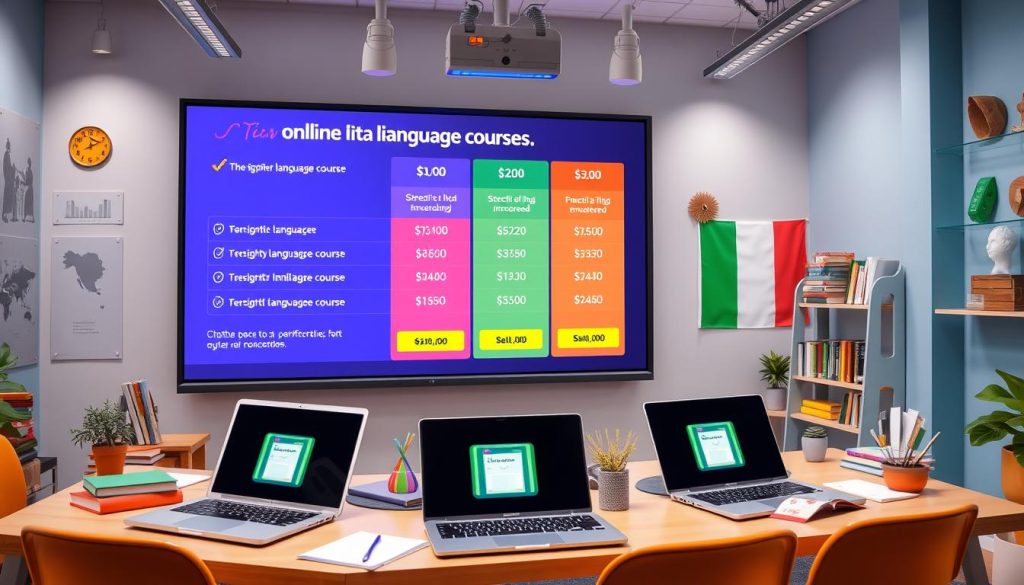Starting an online language school is an exciting venture. It lets you share the beauty of the Italian language with eager learners. The demand for online Italian language courses has grown a lot in recent years.
This is because more people are interested in Italian culture, art, and cuisine. As UK educators, you have a unique chance to tap into this market. This article will guide you through the essential steps to start your online institution. It offers valuable insights tailored for the UK audience.
Key Takeaways
- Identify the increasing demand for Italian language learning in the UK.
- Understand the benefits of starting an online language school.
- Know your target audience to tailor your courses effectively.
- Develop a comprehensive curriculum for teaching Italian online.
- Implement strategic marketing techniques to attract students.
- Ensure compliance with educational regulations for online courses.
Understanding the Demand for Italian Language Learning

The need to learn Italian has grown a lot. This is due to many reasons like cultural interest, migration, education, and travel. The British Council says Italian is one of the top languages people want to learn in the UK.
More students are now taking Italian courses in schools. This shows that Italian is becoming more popular.
People want to learn Italian for many reasons. They might be interested in Italian culture, food, fashion, or movies. Events like culinary festivals in the UK also encourage people to learn Italian.
Benefits of Starting an Online Language School

Starting an online language school has many advantages. Teachers can reach students all over the world. This makes learning languages easier for people in different places.
Online learning is very flexible. Teachers can create courses that fit each student’s needs. This means students can learn at their own pace and on their own schedule.
Starting an online language school can also be profitable. It saves money on things like rent and utilities. The online education market is growing fast. This offers great chances for entrepreneurs to create engaging and effective courses.
Identifying Your Target Audience

Finding out who wants to learn Italian is key to making a great online language school. There are many types of learners. This includes students of all ages, professionals looking to grow their careers, travellers wanting to dive into Italian culture, and expats trying to fit in.
Doing deep market research is crucial. Surveys and tests help find out who these learners are. They tell us about their age, education, and career goals. This info helps teachers understand what each student needs and likes.
With this knowledge, teachers can create courses that speak to each group. For instance, kids might enjoy games and fun activities, while adults might like serious lessons that boost their career skills. Tailoring lessons to fit each learner’s needs makes them happier and more engaged.
Essential Steps for Starting an Online Language School for Italian Learners

To start a successful online Italian language school, follow key steps. Focus on a clear curriculum and the right technology. These steps will help you create a great learning experience for your students.
Defining Your Curriculum
A good curriculum is the heart of your online course. It’s important to set clear goals and choose topics that interest learners. Here’s how to do it well:
- Set learning goals based on students’ skill levels.
- Pick topics that show Italy’s culture.
- Use different teaching methods, like interactive activities.
- Follow the CEFR (Common European Framework of Reference for Languages) for your curriculum.
Choosing the Right Technology Platform
Choosing the right technology is crucial for your online school. Think about:
- How easy it is for teachers and students to use.
- If it can grow with your school.
- Support for technical problems.
- How well it works with tools like video calls.
Platforms like Moodle, Teachable, and Thinkific are great for creating engaging Italian courses.
Creating Engaging Course Content

Creating engaging online course content is key to keeping students interested and helping them learn. A good curriculum mixes different types of resources like videos, quizzes, and downloads. These tools make learning more fun and help students understand Italian better.
Using real-life examples in lessons makes learning more practical. This approach helps students see how they can use what they learn. Also, teaching in different ways helps all students find what works best for them.
It’s important for course content to be up-to-date and culturally relevant. Using modern Italian resources makes lessons more interesting. Keeping materials fresh keeps students excited about learning, leading to better results.
Developing Effective Marketing Strategies

Creating strong marketing plans for online schools is key to success. A good online presence helps attract students and shows authority in teaching Italian. By using different platforms, teachers can show their skills and what courses they offer.
Utilising Social Media Platforms
Social media is crucial for reaching out to potential students. Sites like Facebook, Instagram, and LinkedIn are great for promoting online courses. Here are some tips to increase your reach:
- Create posts that explain why learning Italian is good.
- Share stories of students who have succeeded to build trust.
- Use quizzes or language challenges to keep users engaged.
- Target ads to people who might be interested in learning a language.
By using social media well, teachers can improve their marketing. This helps build a community of learners ready to start Italian courses.
Building Your Brand as an Italian Language Educator

In the world of online language teaching, your personal brand is key. A strong brand sets you apart and makes you more credible. Start by sharing your teaching beliefs, values, and skills clearly.
A professional website is the heart of your brand. It should attract your audience and show your dedication to teaching Italian. Adding student testimonials boosts your reputation and shows you’re an expert.
Being active on language platforms can also help your brand. Working with famous names or writing for Italian blogs can make you more visible. Sharing your knowledge and experiences makes you a trusted name in Italian teaching.
Pricing Strategies for Online Language Courses

Setting the right prices is key to making money from teaching languages online. It’s important to think about a few main things when pricing your courses.
- Do your homework on what others charge. This helps you spot where you can stand out.
- Think about what makes your course special. This could be unique features or better teaching methods.
- Remember to cover all costs. This includes tech, materials, and how you’ll market your course.
Using different pricing models can help more people join. Here are a few ideas:
- Try a subscription model. This lets students keep learning for a regular fee.
- Offer courses at different levels. This makes it easier for students to find the right fit.
- Give discounts to new students. This can help get more people interested and signed up.
Free trial classes can really boost your numbers. They let people try before they buy. Using smart pricing can help your online Italian school stand out.
Ensuring Compliance with Educational Regulations

Starting an online language school means you must follow educational rules. These rules protect your school and make it more credible. Teachers need to know about data protection laws, like the General Data Protection Regulation (GDPR), in the UK.
It’s important to stay up to date with legal rules for teachers. Keeping your knowledge current and getting the right accreditation helps a lot. This makes sure your online school follows the law.
Talking to legal experts can help a lot. They can guide you through the tricky parts of online education laws. This way, you can make sure your school is not only legal but also trusted by students and their families.
Providing Excellent Customer Support for Students

Offering top-notch student support is key for a positive learning space in online language schools. Making students feel valued and supported boosts their satisfaction. Quick help through live chat, email, and forums helps learners overcome hurdles.
Students learn better when they get fast, clear help. Regular feedback lets teachers know what students need. This shows a real care for online education and builds a strong learning community.
Incorporating Feedback for Continuous Improvement

Feedback is key for better education, especially in online language schools. It gives insights that help improve learning experiences. This way, courses stay relevant and effective, keeping up with language learning changes.
Using Surveys and Feedback Forms
Surveys and feedback forms after each course help gather student thoughts. This data shows what works well and what needs work. It makes students feel more involved in their learning.
Using feedback has many benefits:
- It helps make courses better based on what students say.
- It lets teachers adjust their methods to what students like.
- It shows what topics need more detail or explanation.
By using this feedback, teachers can make education better. This leads to courses that fit different learners’ needs and keep high standards. It makes learning better and keeps students loyal and engaged.
Leveraging Online Communities for Growth

Online communities are key for language teachers wanting to improve. Sites like forums, social media groups, and educational networks are great for networking. They offer chances to share knowledge and learn from others.
Working with other language experts boosts your reputation and gets you noticed. You can find important resources and team up on projects. This teamwork creates a friendly atmosphere and brings new ideas to teaching.
Using platforms like Discord or Facebook Groups helps build a supportive student community. This space lets students help each other and stay interested in learning. It makes learning Italian more fun and effective.
Networking with Other Language Educators

Networking with other language educators is key for growth and teamwork. It makes learning better for teachers and students. Joining groups like the Association of Language Learning helps build a community of education lovers.
Collaborations in education can happen in many ways. For example:
- Creating new projects together to offer more learning options.
- Organising workshops to share teaching tips and new methods.
- Joining online discussions or webinars to talk about new trends and problems.
By working together, educators can share knowledge, ideas, and methods. This sharing makes learning richer and helps teachers grow. It keeps them updated with the latest in teaching and technology.
Accessing Resources for Italian Language Teaching

Educators looking to improve their Italian language courses have many resources at their disposal. These include top books and online courses. They help in teaching methods and boost educators’ skills.
Recommended Books and Materials
There’s a lot of literature that gives key insights for teaching Italian. Here are some of the best books for language courses:
- “Italian Grammar Drills” by Paola Nanni-Tate
- “The Italian Language: A Very Short Introduction” by Gareth Williams
These books cover grammar, culture, and teaching strategies. They are essential for language teachers.
Online Courses and Certifications
Many online teaching certifications are available. Places like iTEFL and the University of Cambridge offer them. These focus on teaching best practices and online learning strategies.
By taking these courses, educators can improve their skills. This makes them more competitive in the field.
Managing Your Time and Resources Effectively

Good time management is key for online language schools. A well-planned schedule helps with lessons, student chats, and marketing. This keeps the school running smoothly.
Using tools like Trello or Asana makes things easier. They help track tasks and see how things are going. This keeps everyone on track and makes sure important tasks don’t slip through the cracks.
It’s also important to use resources wisely in online teaching. Spending on good technology and marketing helps students learn better. By managing resources well, every part of the school works together for success.
Long-term Goals for Your Online Language School
Setting long-term goals is key for your online language school’s growth. You can aim to offer more courses or enter new markets. This helps create a clear plan for your school’s future.
It’s important to regularly check and update these goals. This keeps your school in line with the latest in language education. By doing this, you can improve your courses and attract more students.
Having clear goals helps your school stand out in the online education world. Success comes from always checking and changing your plans. This way, you can create a great learning space for all students.









